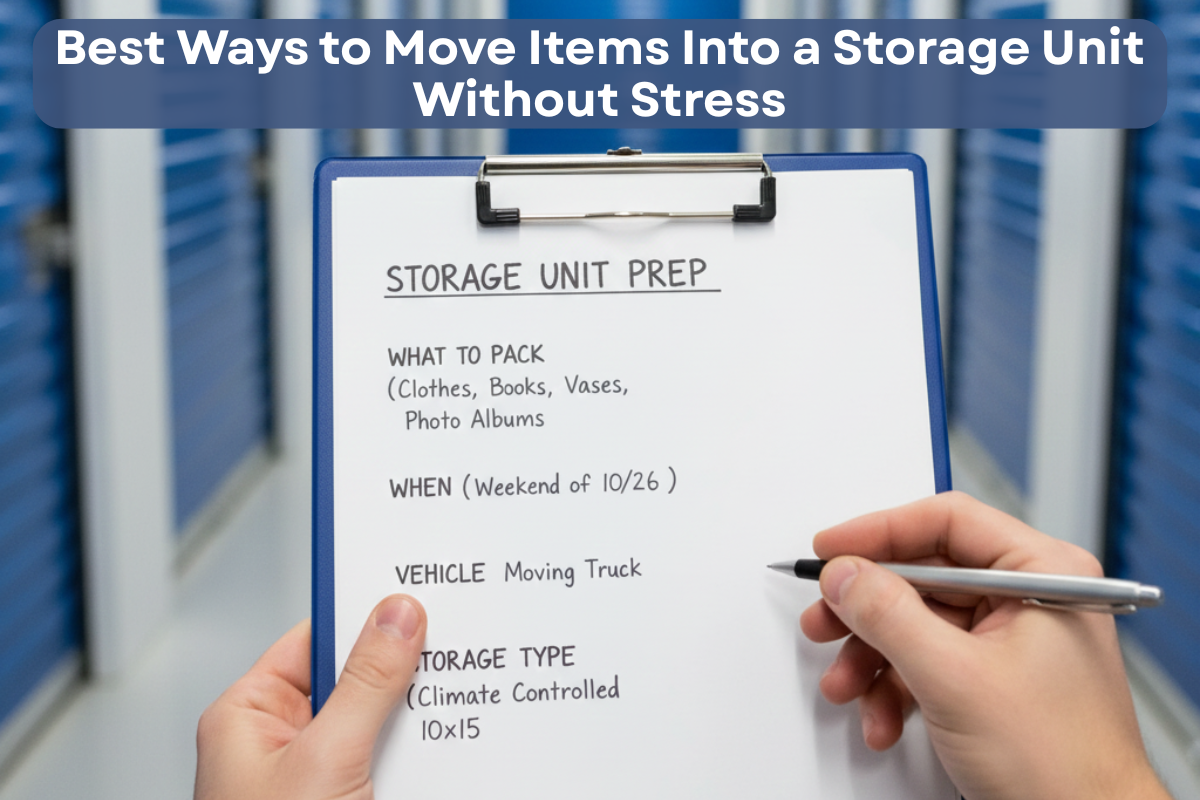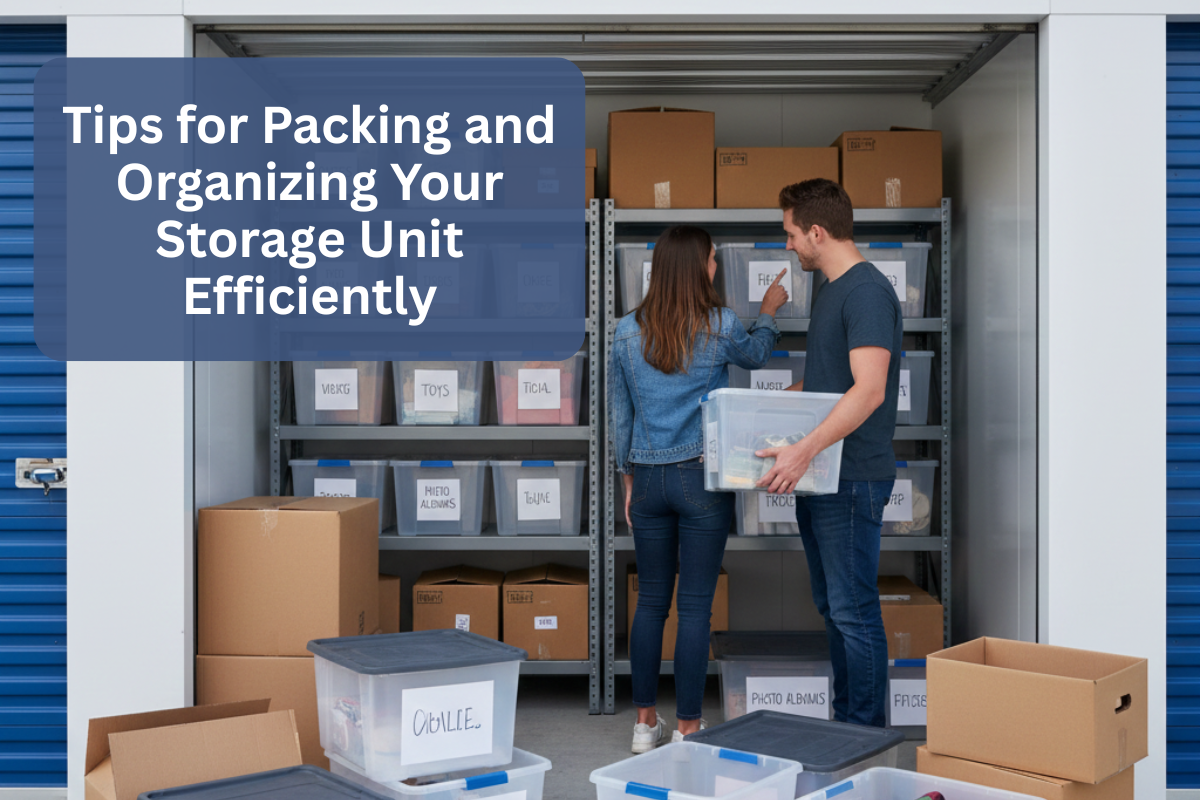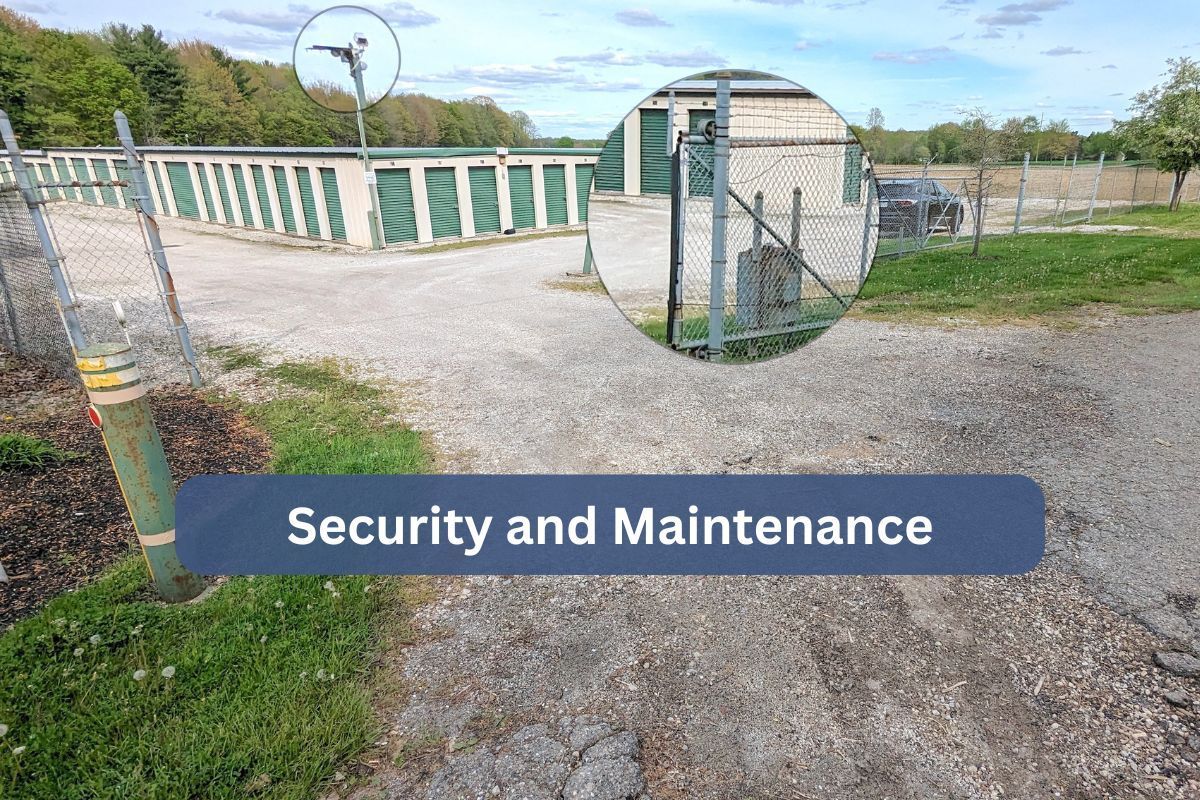Long-Term Storage Tips for Military Families
Dove Storage • August 19, 2025
Military families are no strangers to frequent moves, deployments, or long-term relocations. Whether you're heading overseas, receiving new PCS (Permanent Change of Station) orders, or preparing for an extended deployment, managing your household items during these transitions can be a major challenge.
That’s where long-term self-storage becomes a reliable and convenient solution. By storing your belongings in a secure storage unit, military families can protect valuables, simplify moves, and reduce stress during extended absences.
Here's a comprehensive guide with practical tips to help U.S. military families make the most of long-term storage.
1. Choose a Military-Friendly Storage Facility
Start by selecting a storage facility that understands the unique needs of military families. Many offer military discounts, flexible lease options, and month-to-month contracts. Look for facilities that offer:
- Security features (surveillance cameras, gated access, individual alarms)
- Climate-controlled units (especially for electronics, documents, or furniture)
- Easy online account management and autopay options
- Accessibility near your base or future location
Pro Tip:
Ask if the facility offers deployment accommodations—some waive fees or offer flexibility during active duty.
2. Opt for Climate-Controlled Units
Military families often store items for 6 months to several years. A climate-controlled storage unit helps protect your belongings from humidity, extreme temperatures, and seasonal changes. Best for storing:
- Electronics and appliances
- Photos, artwork, and paper documents
- Wooden or leather furniture
- Clothing and fabrics
- Musical instruments
- Without climate control, sensitive items can warp, mold, or degrade over time, especially in areas with harsh summers or winters.
3. Organize and Label Everything Clearly
When you're gone for months or years, it’s easy to forget what you stored—or where you stored it. Labeling boxes clearly by room or item category can save you serious time when retrieving items later.
Tips for organization:
- Use color-coded labels or stickers for each room (e.g., kitchen, bedroom, office).
- Create a digital inventory or spreadsheet with box contents.
- Take photos of valuable or sensitive items before storing.
Pro Tip:
Keep one master list of what’s stored, including serial numbers for electronics, and store it digitally (e.g., in Google Drive or Dropbox) for easy access.
4. Use Uniform-Sized, Durable Boxes
Sturdy, similarly-sized boxes stack more efficiently and maximize vertical space in your unit. Opt for plastic bins with secure lids for items you want extra protection from dust and pests.
Boxing best practices:
- Don’t overpack—heavy boxes can weaken or break over time.
- Place heavier boxes on the bottom and lighter ones on top.
- Avoid using grocery store boxes—they’re often flimsy and can attract pests.
5. Disassemble Large Furniture
Large furniture like bed frames, desks, and dining tables should be disassembled to save space and prevent damage. Wrap individual parts with bubble wrap or moving blankets, and store hardware (screws, bolts) in labeled plastic bags taped to the item.
Additional protection tips:
- Use furniture covers or blankets for long-term dust protection.
- Store mattresses flat, not on their sides, to prevent warping.
- Place pallets or tarps on the unit floor to elevate furniture and boxes from potential moisture.
6. Avoid Storing Prohibited or Perishable Items
Military families should carefully check what cannot be stored in a unit. Every facility has restrictions, but common prohibited items include:
- Food or perishables (they attract pests)
- Flammable materials (gas, propane, fireworks)
- Plants, animals, or anything living
- Firearms or ammunition (check with the facility's policy)
- Storing these items can violate your rental agreement and pose safety hazards.
7. Plan for Accessibility
Although long-term storage implies items won’t be touched for a while, you may need access to key things unexpectedly—especially if you're reassigned back home earlier than expected. To stay prepared:
- Store important documents and seasonal items (like winter clothes) in front.
- Create clear walking paths inside the unit.
- Keep a small “last in, first out” section with essential or frequently needed items.
Pro Tip:
Consider using shelves to make better use of vertical space and improve visibility.
8. Ensure Your Belongings Are Insured
While storage facilities have security measures, accidents can happen. Many offer insurance options, or you may already have coverage through renters or homeowners insurance. When choosing insurance, check:
- Coverage limits and deductibles
- Exclusions for high-value items (e.g., jewelry, collectibles)
- Special military clauses for long-term deployment
- If you’re storing high-value belongings, be sure to document their condition before placing them in storage.
9. Set Up Auto-Pay and Leave Emergency Contact Info
During deployment or overseas reassignment, managing payments can be tricky. Avoid missed rent or late fees by setting up automatic payments through the facility’s portal. Also:
- Provide an emergency contact who can act on your behalf.
- Share storage access information (e.g., unit number, gate code) with a trusted friend or family member.
Self-storage provides military families with a secure, affordable, and flexible solution during times of transition. Whether you're stationed abroad, moving between bases, or preparing for deployment, a well-organized and properly packed storage unit can give you peace of mind. With a bit of planning and smart packing, you can protect your belongings and focus on what matters most—serving your country and caring for your family. Look for military-friendly storage providers that understand your needs and support your journey.

As the seasons change, so do the items that take up space in our homes. Holiday décor, lawn tools, patio furniture, and winter gear each serve their purpose for only a few months out of the year—but finding a place to keep them the other nine months can quickly create clutter. Closets overflow, garages become chaotic, and valuable living space gets lost beneath piles of seasonal things. Self-storage offers a simple, flexible solution that keeps your home organized while protecting the belongings you only need part of the year. With the right approach, you can store seasonal items efficiently and access them easily when their season comes around again. Here’s how to make it work. 1. Start by Sorting Seasonal Items Thoughtfully Before moving anything into storage, take a few minutes to assess what you actually use. Walk through your garage, attic, or closets and sort items into four categories: keep, store, donate, and toss. Ask yourself: Will I need this item before next season? Does it take up too much space to keep at home? Is this something I only use seasonally? Holiday décor, lawn equipment, gardening tools, patio cushions, sports gear, and winter clothing are ideal candidates for seasonal storage. Moving these items out of your living areas helps restore order and create breathing room at home. Pro Tip: As you sort, group items by season. This makes packing—and unpacking—much easier later. 2. Choose the Right Storage Unit for Seasonal Items Different seasonal items have different storage needs. Selecting the right type of storage unit helps protect your belongings and makes access more convenient. Here’s what to consider: Climate-Controlled Units: Best for holiday décor, seasonal clothing, candles, wood items, photos, or anything that might warp or deteriorate in extreme temperatures. Drive-Up Units: Perfect for bulky gear such as snow blowers, lawn mowers, bicycles, or patio furniture. Drive-up storage makes loading and unloading much easier. Indoor Units: Offer added weather protection and great for items that need a stable environment. Dove Storage offers a variety of unit sizes and types designed to fit seasonal storage needs—from small units for décor to large units for equipment and furniture. 3. Pack and Organize Seasonal Items for Long-Term Efficiency Packing properly helps prolong the life of your belongings and keeps your storage unit easy to navigate. Use these tips: Use durable, uniform boxes: They stack well and prevent items from being crushed. Label each box clearly: Include the contents and the season they belong to (e.g., “Christmas – Lights & Ornaments”). Use shelving when possible: This keeps smaller items off the floor and helps maximize space. Store heavy items low, lighter items high: To prevent damage and make grabbing them safer. Pro Tip: Pack fragile holiday décor in padded containers or specialty ornament bins to avoid breakage. 4. Prepare Lawn Equipment and Outdoor Gear Before Storing Lawn equipment and outdoor furniture require a bit of preparation before being placed into storage. A few simple steps can extend their life and ensure they’re ready to use next season. For lawn equipment: Empty fuel from mowers and trimmers Clean off grass and debris Oil metal parts to prevent rust Remove batteries For patio furniture: Clean cushions and allow them to fully dry Protect furniture with breathable covers Disassemble pieces if possible to save room Taking these steps helps avoid mildew, rust, and damage during off-season months. 5. Rotate Items In and Out With the Seasons Seasonal rotation is one of the biggest advantages of having a storage unit. It keeps your home clutter-free and functional throughout the year. Here’s a simple rotation schedule: Spring/Summer Storage: Holiday decorations Winter clothing and boots Snow blowers and shovels Space heaters Ski gear Fall/Winter Storage: Lawn mowers and gardening tools Pool toys and beach gear Patio furniture Camping equipment Sports equipment for warm-weather activities This approach creates a natural flow that keeps your home organized and your storage unit useful all year long. 6. Protect Fragile and Sentimental Seasonal Items Many seasonal belongings—such as ornaments, keepsakes, vintage decorations, or specialty tools—need extra care. Use these protection tips: Store décor in airtight or moisture-resistant containers Wrap fragile items individually Keep valuable or delicate items in climate-controlled units Use plastic bins instead of cardboard for long-term durability Pro Tip: Keep a digital inventory of stored seasonal items. It prevents duplicate purchases and saves time when searching for something. 7. Keep Your Storage Unit Organized Season After Season Maintaining your storage unit is just as important as organizing your home. With seasonal items rotating in and out, aim for a quick check-in every few months. To stay organized: Keep the most recent season’s items near the front Avoid overpacking boxes Use shelving to prevent piles from toppling Adjust your layout as your seasonal needs change Regular check-ins ensure your unit stays functional and clutter-free—even as your belongings shift throughout the year. A tidy home isn’t about minimizing what you own—it’s about managing it smartly. Seasonal storage helps you enjoy an organized home year-round without giving up the décor, equipment, and gear that make every season enjoyable. At Dove Storage , we provide clean, secure, and budget-friendly storage options to keep your seasonal items protected and out of the way until you need them again. Visit Dove Storage today to find the perfect space for your seasonal storage needs.

Moving items into a storage unit doesn’t have to be overwhelming. With a little planning, organization, and smart packing techniques, you can make the process smooth, efficient, and stress-free. Whether you’re storing seasonal items, furniture, or sentimental keepsakes, these strategies will help you protect your belongings and keep your storage unit organized from the start. 1. Plan Ahead and Make a Checklist Before you start moving, take a few minutes to plan your storage move. A clear plan helps you avoid last-minute chaos and ensures nothing gets forgotten. Inventory Your Items: Make a list of everything you plan to store. This helps with packing and labeling. Decide What to Store First: Place frequently used items or seasonal gear in boxes that are easy to access. Estimate Box and Supply Needs: Gather boxes, packing tape, bubble wrap, and markers in advance to avoid interruptions. Pro Tip: Break down the move into manageable steps rather than trying to do everything at once. 2. Use Proper Packing Techniques Packing correctly protects your belongings and makes loading your storage unit easier. Uniform Boxes: Using boxes of similar size makes stacking simpler and maximizes space. Label Everything Clearly: Include contents and the room each item belongs to for easy retrieval. Wrap Fragile Items: Use bubble wrap, packing paper, or towels to prevent damage. Fill Empty Spaces: Use soft items like blankets or towels to fill gaps inside boxes and prevent shifting. Pro Tip: Place heavier items on the bottom and lighter boxes on top to avoid crushing fragile belongings. 3. Organize Your Storage Unit Strategically How you arrange items in your storage unit can save time and reduce stress later. Create a Clear Path: Leave a walkway so you can reach items in the back without moving everything around. Front-to-Back Access: Store items you’ll need more often near the front. Less-used items can go in the back. Use Vertical Space: Stack boxes carefully and consider adding shelving to maximize storage. Pro Tip: Keep a small map or inventory list showing where items are stored to make retrieval easier. 4. Protect Your Items from Damage Proper protection keeps your belongings safe while in storage. Plastic Bins for Sensitive Items: Use airtight bins for documents, photos, or fabric items to keep them safe from dust or moisture. Cover Furniture: Blankets or furniture pads prevent scratches and dents during transport and storage. Keep Electronics Safe: Remove batteries from devices and store in original packaging if possible. Pro Tip: Avoid placing items directly on the floor to reduce the risk of moisture damage—use pallets or shelving. 5. Pack Smart for Easy Moving The easier your items are to move, the less stressful the process will be. Group Similar Items: Keep like items together to simplify unpacking. Use Smaller Boxes for Heavy Items: Books, tools, and kitchenware are easier to carry in smaller boxes. Disassemble Large Furniture: Remove legs or shelves to make pieces easier to transport. Pro Tip: Take photos of complex furniture or electronics before disassembly so you can reassemble without hassle. 6. Take Advantage of Seasonal Rotations Using your storage unit to rotate seasonal items keeps your home organized year-round. Seasonal Gear: Store winter coats and sports equipment during warmer months and swap them with summer gear when needed. Holiday Décor: Pack holiday decorations and décor into labeled boxes so they’re easy to find when the season comes. Pro Tip: Keep a seasonal schedule to know exactly when items need to be swapped out. 7. Maintain an Organized Storage Unit Even after everything is moved, a little upkeep keeps your storage unit efficient. Regular Check-ins: Visit periodically to rotate items, reorganize, and inspect for damage. Avoid Overpacking: Heavy boxes can crush lighter ones, so stack with care. Update Your Inventory: Keep a running list of stored items to prevent duplicates or forgotten belongings. Pro Tip: Treat your storage unit like an extension of your home—it’s easier to manage if you keep it organized from day one. Moving items into a storage unit doesn’t have to be stressful. With careful planning, smart packing, and organized placement, you can protect your belongings and save time during retrieval. At Dove Storage , we offer clean, secure, and affordable storage units to make your move easier. Explore our storage solutions today and find the perfect fit for your home organization needs.

Storing items for the long term can feel overwhelming, especially if you want to protect them from damage while keeping your storage organized. Whether you’re relocating, downsizing, or simply creating space at home, proper preparation is key. With a few thoughtful steps, you can ensure your belongings stay safe and accessible—even months or years later. Here’s how to get started. 1. Assess What Needs Long-Term Storage Before you pack anything, take a careful look at your items. Ask yourself: Is this something I’ll need in the next few months or years? Could this item be damaged if stored improperly? Does it have sentimental or financial value? Items like seasonal décor, furniture, collectibles, documents, and keepsakes are ideal candidates for long-term storage. Start by grouping them based on how you’ll use or access them in the future. Pro Tip: Create a simple inventory list with descriptions and photos of your items. This helps track what’s in storage and avoids unnecessary duplicate purchases. 2. Choose the Right Storage Unit Not all storage units are designed for long-term use. Selecting the right type can protect your items from temperature swings, moisture, and pests. Consider these options: Climate-Controlled Units : Best for sensitive items like electronics, wooden furniture, artwork, and important documents. These units maintain consistent temperature and humidity levels. Drive-Up Units : Convenient if you plan to access bulky items periodically. I ndoor Units : Provide an extra layer of protection from weather and pests, helping preserve delicate belongings. Choosing a unit suited to your items’ needs will save you time, money, and stress down the road. 3. Clean and Prepare Items Properly Long-term storage works best when items are clean and protected. Furniture: Dust, clean, and polish wooden surfaces. Cover with breathable furniture covers or sheets. Avoid plastic wrap directly on wood, as it can trap moisture. Clothing and Textiles: Wash, dry, and fold garments before storing. Store in airtight containers or vacuum-sealed bags to protect against moisture, dust, and pests. Electronics: Remove batteries and store in original packaging if possible. Wrap cords separately and label them clearly. Documents and Photos: Use acid-free folders, plastic bins, or waterproof containers to prevent water damage or fading. Pro Tip: Avoid storing items directly on the floor. Use pallets or shelving to improve airflow and prevent moisture damage. 4. Pack Efficiently for Long-Term Storage Proper packing protects your items and maximizes your storage space: Use Sturdy Boxes: Heavy-duty, uniform boxes stack easily and reduce the risk of crushing. Label Everything: Include the contents and room for each box. Numbering your boxes can also make tracking easier. Wrap Fragile Items: Use bubble wrap, packing paper, or blankets for breakables. Fill gaps in boxes to prevent shifting during storage. Disassemble When Possible: Remove legs from tables or shelves, and nest smaller items inside larger ones to save space. Pro Tip: Keep an aisle in your storage unit for easier access to boxes stored at the back. 5. Protect Against Moisture and Pests Long-term storage requires proactive protection: Place moisture absorbers or silica gel packets inside boxes with sensitive items. Avoid storing items that can attract pests, such as food or organic material. Consider a dehumidifier for units prone to humidity. Taking these precautions will help ensure your items remain in the same condition as when you packed them. 6. Organize for Future Access Even if your items won’t be accessed often, organization saves time: Keep seasonal or frequently needed items near the front. Group similar items together (e.g., holiday decorations, sports equipment, tools). Maintain a digital or physical inventory for quick reference. Pro Tip: Number your boxes and cross-reference with your inventory. This makes finding specific items much faster when you need them. 7. Maintain Your Storage Over Time A little maintenance can prevent problems before they start: Periodically check for signs of moisture, pests, or damage. Reorganize boxes if items have shifted or settled. Update your inventory as you add or remove items. Routine attention ensures your long-term storage remains secure, clean, and accessible. Final Thoughts Long-term storage doesn’t have to be stressful. By preparing your items carefully, choosing the right unit, and staying organized, you can preserve your belongings for months—or even years—while keeping your home clutter-free. At Dove Storage , our clean, secure, and affordable storage units are designed to protect your items and fit your lifestyle. Explore our storage solutions today and take the first step toward a more organized home.

Packing for a storage unit doesn’t have to feel overwhelming. With the right plan, you can maximize space, protect your belongings, and make it easy to find what you need later. Whether you’re storing seasonal décor, extra furniture, moving items, or keepsakes, a well-organized unit helps you stay clutter-free at home while keeping everything accessible and secure. Here’s how to pack and organize your storage unit efficiently. 1. Start With a Clear Plan Before You Pack Before placing anything into your storage unit, take some time to plan what’s going in, how often you’ll need to access it, and what needs extra care. Sort items into groups: Store Keep at home Donate Discard Ask yourself: Will I need this soon, or is it seasonal? Does this item have sentimental or long-term value? Should this be stored in a sturdy bin or a simple moving box? This step saves time when loading your unit and prevents unnecessary clutter. Pro Tip: Create a simple inventory list—either on paper or on your phone—to track what you’re storing. 2. Choose the Right Storage Unit for Your Needs At Dove Storage, we offer a variety of unit types designed to protect your belongings and provide convenient access. Here are some options to consider: Climate-Controlled Units Ideal for sensitive items like photos, electronics, wood furniture, artwork, and documents. These units help maintain a stable temperature and humidity level, preserving your valuables over time. Drive-Up Units Perfect for heavy or bulky items. You can pull your vehicle right up to the door, making loading and unloading easier. Indoor Units Great for added protection from outdoor elements, often located inside secure, monitored buildings. Choosing the right space ensures your items stay in good condition and accessible when you need them. 3. Pack Smart for Safety and Space Efficiency Packing the right way is essential for maximizing your unit and keeping everything safe. Use Sturdy, Uniform Boxes Same-size boxes stack neatly and make it easier to build stable rows. Label Everything Clearly Write the room, category, and specific contents on each box. When you come back months later, you’ll be grateful you did. Use Shelving When Possible Shelving units help elevate boxes, improve airflow, and make it easier to grab what you need without digging through stacks. Leave a Center Aisle Creating a walkway down the middle of your unit ensures you can reach items in the back without having to move everything around. Pro Tip: Store heavier items on the bottom, lighter ones on top, and keep fragile items in protected corners or shelves. 4. Organize Based on How Often You’ll Need Items Accessibility is key. Place items you’ll need more frequently toward the front of the unit. Examples: Holiday décor Sports equipment Baby items you’re rotating out Tools or small appliances you use occasionally Less frequently used items—like long-term keepsakes, archived documents, or bulky furniture—can be placed toward the back. This simple strategy saves you time and keeps your unit frustration-free. 5. Protect Fragile, Valuable, and Sentimental Items If you’re storing items with personal or monetary value, it’s worth taking extra steps to keep them safe. Tips: Wrap breakables in bubble wrap or foam Use airtight bins for photos, documents, and fabrics Avoid stacking anything heavy on delicate items Keep electronics off the floor in case of unexpected moisture At Dove Storage, our facilities are equipped with features such as secured access points, onsite management, and well-maintained buildings to help protect your belongings. Pro Tip: Store mirrors, frames, and TVs vertically—not flat—to prevent damage. 6. Maximize Your Space With Smart Layout Techniques A strategic layout makes your unit feel larger and easier to navigate. Try these layout ideas: Line the walls with boxes and stack vertically Use furniture like dressers or bookshelves to store smaller items inside Place mattresses and bed frames upright to save space Fill hollow spaces—like drawers, bins, or plastic totes—with lighter items By using every inch intentionally, you’ll make your storage unit work harder for you. 7. Maintain Your Storage Unit Over Time Staying organized doesn’t stop after you close the door. Make it a habit to visit your unit periodically to: Rotate seasonal items Check boxes for wear or sagging Update your inventory list Rearrange items as needed to keep pathways clear A few minutes every season helps keep your storage unit efficient, safe, and ready whenever you need something. A Well-Packed Unit Makes Life Easier Packing and organizing your storage unit isn’t just about saving space—it’s about reducing stress, protecting what matters, and creating a more comfortable home. A well-planned storage strategy ensures you can find your belongings easily and keep your living space open and clutter-free. At Dove Storage, we’re here to make your storage experience simple, secure, and stress-free. Our clean, affordable units are designed to fit your needs—whether you're storing furniture, seasonal décor, or sentimental items. Visit Dove Storage today to find the perfect unit for your next move, home project, or decluttering journey.

Moving into a new home—or simply reorganizing your current one—can feel overwhelming. Between packing, sorting, and trying to keep track of everything, it’s easy for clutter to pile up and stress to creep in. But with the right plan (and the right storage solutions), your move can feel smoother, more efficient, and far less chaotic. Whether you’re downsizing, upgrading, or giving your space a fresh start, using a storage unit can make the entire process more organized and manageable. Here’s how to approach moving and home organization with confidence—and how Dove Storage can support you every step of the way. 1. Start Fresh With a Strategic Declutter Before you pack a single box, take time to review what you own. Moving offers the perfect opportunity to start fresh and lighten the load. Walk through your home room by room and sort items into four simple categories: keep, pack, store, and let go. Ask yourself: Do I still need or use this? Is it seasonal or occasional? Will storing it make my move easier? Items like holiday décor, bulky sports gear, extra furniture, or keepsakes are great candidates for a storage unit. Storing these items before moving day helps reduce clutter and makes packing more focused and efficient. Pro Tip: As you sort, label items clearly—this saves time and prevents mix-ups later. 2. Pick the Best Storage Unit for Your Move Choosing the right type of storage unit can simplify your entire moving process. Here are a few options to consider: Climate-Controlled Units: Best for sensitive items like wood furniture, electronics, photos, and important documents. They help protect belongings from temperature and humidity changes. Drive-Up Units: Ideal for large or heavy items. Pull your vehicle right up to the door for easy loading and unloading. Indoor Units: A great option for added protection from weather, with access inside secure buildings. At Dove Storage , you’ll find a variety of unit sizes and types designed to fit your needs. Whether you’re storing a few boxes or an entire household’s worth of belongings, there’s a unit that matches your move. 3. Pack Smart for a Smooth Moving Day Packing isn’t just about getting items into boxes—it’s about setting yourself up for an organized new beginning. Here’s how to pack efficiently: Use uniform boxes so they stack easily and safely. Label all sides of your boxes with clear descriptions. Keep essentials separate , such as toiletries, clothing, chargers, or kitchen basics. Use sturdy bins or shelves inside your storage unit to keep everything accessible and off the floor. Pro Tip: Create a simple color-coding system for rooms—this makes unpacking a breeze. 4. Use Storage as a Staging Space One of the biggest moving hacks is using a storage unit as a temporary holding area. Store non-essential or bulky items before moving day so your home stays clutter-free while you pack. This makes: Cleaning easier Staging your home smoother Moving furniture safer and more organized Once you’re settled in your new place, you can bring items back gradually—or keep them stored for seasonal use. 5. Protect Your Most Important Belongings Whether you’re moving across town or reorganizing your home, some items need extra care. Consider using storage for valuables or fragile belongings, such as: Family heirlooms Photo albums or artwork Collectibles Important documents Antique furniture For added safekeeping, pack items in airtight or waterproof containers and store them in a secure, monitored facility like Dove Storage . Pro Tip: Keep a digital inventory so you always know where everything is. 6. Organize Your New Home With Purpose Once your move is complete, take your time settling in. A storage unit gives you the flexibility to bring items back into your home gradually—and intentionally. With fewer items to unpack at once, you can: Design each room intentionally Reorganize closets without pressure Keep garages and hallways clear Avoid clutter from day one A storage unit acts as an extension of your new home—available when you need it, out of the way when you don’t. 7. Maintain Your Storage Unit Over Time Just like your home, your storage unit works best when it’s maintained regularly. Every few months: Rotate seasonal items Check for damaged containers Refresh labels Reorganize shelves Remove items you no longer need Staying organized helps your storage unit remain a practical, efficient tool during and after your move. Make Your Move Easier With Dove Storage Moving doesn’t have to be stressful. With intentional planning, smart packing, and the convenience of a storage unit, you can create a more organized transition and a more comfortable home. At Dove Storage , we offer clean, secure, and affordable storage solutions designed to fit every stage of your move. Explore unit sizes, features, and availability at DoveStorage.com and find the perfect fit for your moving or organizing needs. Let’s make your next move your smoothest one yet.

Keeping your belongings safe and in great condition starts with choosing the right storage solutions—and maintaining them well throughout the year. Whether you’re storing seasonal décor, family keepsakes, furniture, or business items, proper care and organization go a long way. With a little planning and the right storage setup, you can protect your items from temperature changes, dust, wear, and accidental damage. Here’s how to store your belongings confidently all year long. 1. Start With Smart Packing Before moving anything into storage, take time to pack with protection in mind. The right materials significantly reduce the risk of damage, especially during long-term storage. Here are a few essentials to use: Sturdy, uniform boxes for easier stacking Bubble wrap , packing paper, or foam to cushion delicate items Plastic bins for moisture-sensitive belongings Quality packing tape to secure boxes properly Ask yourself: What items are most fragile? What needs extra padding or a waterproof container? Which items will I need to access sooner? Pro Tip: Double-box breakables—like dishware and glass décor—for added security. 2. Choose the Right Storage Unit for Your Needs Not all items store the same way. Selecting the right type of storage unit is key to maintaining the condition of your belongings, especially during seasonal changes. At Dove Storage, you’ll find a variety of unit types designed to help safeguard your items year-round: Climate-Controlled Units: These maintain a stable environment, making them ideal for photos, wood furniture, electronics, documents, and artwork. Drive-Up Units: Perfect for bulky items, tools, equipment, and anything you want easier access to. Indoor Units: Located inside secure buildings, these offer an added layer of protection from outdoor elements. If you’re storing temperature-sensitive or high-value items, a climate-controlled unit is a smart investment. 3. Organize Your Storage Unit Thoughtfully Once you’ve packed everything, how you arrange your unit matters just as much. A well-organized unit keeps your items protected and makes future access stress-free. Try these tips: Use shelving: Keep boxes elevated for airflow and ease of access. Stack heavier boxes on the bottom, lighter boxes on top. Label everything clearly with item descriptions and rooms. Leave a small aisle down the center so you can reach items without unstacking everything. Pro Tip: Keep frequently used items—like seasonal decorations or sports gear—near the front. 4. Protect Items From Temperature & Seasonal Changes Seasonal temperature shifts are one of the biggest threats to stored belongings. Even in well-maintained facilities, certain items need extra care to avoid warping, fading, cracking, or mildew. Here’s how to protect your items year-round: Use climate-controlled storage for wood furniture, electronics, photos, collectibles, and paperwork. Avoid plastic bags , which trap moisture and cause mold. Use breathable fabric covers for furniture and mattresses. Place moisture absorbers (like silica gel packs) inside boxes with sensitive items. Rotating seasonal items—like holiday décor, winter coats, or summer gear—also helps prevent overcrowding and keeps your unit organized. 5. Keep Valuables and Sentimental Items Extra Secure If you’re storing irreplaceable pieces or family keepsakes, give them a little additional protection. Dove Storage locations offer gated access, secure indoor units, and well-maintained facilities to help keep your possessions safe. For your most important items: Use airtight, waterproof bins for photos, documents, and fabric items. Wrap delicate memorabilia individually. Keep a digital inventory with photos and descriptions of stored items. This keeps your belongings protected and makes it easier to track what’s inside your unit. 6. Add Protective Accessories A few small accessories go a long way in preventing accidental damage: Furniture covers to protect against dust Pallets or shelving to keep items off the ground Corner protectors for mirrors, frames, or furniture Lock upgrades, such as disc locks, for added peace of mind Pro Tip: Always lock your unit with a high-quality lock—it's one of the simplest ways to enhance security. 7. Check Your Storage Unit Periodically Just like your home, your storage unit benefits from occasional check-ins. Seasonal visits help ensure everything stays organized and protected. During your visits, make sure to: Rotate seasonal items in or out Check boxes for signs of wear or shifting Replace any damaged packing materials Review your inventory list A little maintenance goes a long way in keeping your belongings safe all year long. Storing your belongings doesn’t have to be stressful. With careful packing, smart unit selection, and a consistent organizing system, you can keep your items protected no matter the season. At Dove Storage, we provide clean, secure, and affordable storage options designed to make storing simpler and safer. Whether you're storing household items, business supplies, or seasonal essentials, our units help you stay organized and worry-free—year-round. Visit Dove Storage to find the perfect unit for your needs today.

Keeping your belongings safe is one of the most important things when you choose a storage unit. At Dove Storage, we know peace of mind matters just as much as space. Whether you're storing household items, business inventory, or keepsakes, here are the key security features you should look for — and how Dove Storage delivers. 1. Secure Access Controls Before anything else, your storage facility should make sure only authorized people can enter. Gated or locked perimeter – prevents unauthorized vehicles or folks from entering. dovestorage.com+2dovestorage.org+2 Personalized access codes or keycards for each tenant – so you know access is limited to who should be there. dovestorage.com+1 Drive-up or indoor unit layouts where access points are controlled and supervised. Indoor units typically offer added protection. dovestorage.com+1 Why this matters: If your items are stored behind strong access control, there’s less chance of unauthorized entry, theft or accidental access. At Dove Storage we provide locked entry points and verified tenant access so your unit isn’t just out of sight—it’s out of reach from the wrong people. 2. Surveillance & Monitoring Once access is locked down, the next layer is monitoring. High-definition surveillance cameras covering key zones: entrances, unit halls, exterior perimeters. dovestorage.com+1 Motion sensors or activity detection systems to send alerts if something unusual happens. dovestorage.org+1 Well-lit exteriors and unit corridors to improve visibility and safety. dovestorage.com Why this matters: The presence of cameras and sensors deters potential threats and also helps if you ever need to review an incident. It ensures your items are under watch even when you’re not there. 3. On-Site and Unit-Specific Protections It’s one thing to secure the facility at large; it’s another to safeguard what’s inside your unit. Clean, well-maintained buildings that show the operator is invested in security and upkeep. dovestorage.org Indoor or climate-controlled units that add an extra layer by being inside a secure structure. dovestorage.org+1 Strong, tamper-resistant locks on individual units and encouragement for tenants to use high-quality padlocks. dovestorage.com+1 Why this matters: Even if the facility is secure, if your unit is poorly maintained, or the door lock is cheap, your items may still be vulnerable. At Dove Storage, we partner secure facility design with tenant-friendly advice for best practices (e.g., quality locks, well-stacked units). 4. Digital & Tech-Driven Features Modern facilities go beyond fences and cameras. Digital rentals, access logs, and online payment systems for less paperwork and more transparency. dovestorage.org Smart access systems: keyless entry codes, mobile apps, or unique tenant verification. dovestorage.com Automated monitoring systems that alert staff to anomalies faster. dovestorage.com+1 Why this matters: Technology can make your storage experience smoother and safer — less manual handling means fewer gaps. By integrating digital access and logs, Dove Storage ensures that access is both convenient for you and accountable for us. 5. Transparent Protection & Customer Participation Security isn’t just about what the facility provides—it’s also about what you do. Clear guidelines on what you should store (and how) to minimize risk. dovestorage.com+1 Advice on keeping an inventory of your stored items, taking photos, and using quality containers/locks. dovestorage.com Protection plan or insurance options to cover unexpected events or losses. dovestorage.com Why this matters: The best security features in the world won’t fully protect you if you don’t participate in the process. At Dove Storage we’ll walk you through best practices: packing well, labeling clearly, and keeping records to make sure your items are retrievable and protected. 6. Routine Maintenance & Facility Condition A strong security system is only effective if the facility is well-maintained. Regular inspections to ensure cameras, gates, locks, and lighting are all operational. Clean, dry storage units free from leaks, pests, or structural issues. dovestorage.org+1 Clear signage, good landscaping (which can reduce hiding spots), and safe pathways for customers. Why this matters: A neglected facility raises risk — from water damage to break-ins. At Dove Storage we commit to clean, well-kept facilities because security starts with good upkeep. 7. Access for Peace of Mind (Within Operational Structure) While some storage providers advertise “round-the-clock” access, what matters most is that you can access your unit when you need it, and that access is secure. During operating hours (or the access hours your facility supports), the facility should manage secure entry and exit. Even outside normal hours (if available), access should still be covered by the same strong controls, surveillance and logging. Your ability to retrieve items shouldn’t compromise security—for example, by having unlocked doors or unrestricted entry. Why this matters: The flexibility to access your items is valuable—but only if it doesn’t reduce safety. At Dove Storage we focus on giving you secure access under controlled conditions, so you’re never trading convenience for risk. Final Thoughts Choosing a storage unit is more than just finding space—it’s about finding safe space. With the right features in place, you can store with confidence. At Dove Storage, we bring together solid access controls, modern surveillance, digital tools, and customer-centered practices so you can focus on what matters: your belongings, not the “what ifs.” If you’re ready to store items and want a facility built with security in mind, visit us or contact us to learn how Dove Storage can help make a smart, safe choice for your storage needs.

When you rent a self-storage unit, you’re trusting it to keep your belongings safe and secure. Whether you’re storing furniture, business inventory, seasonal décor, or sentimental keepsakes, it’s easy to assume your items are fully protected once inside a storage facility. However, while facilities like Dove Storage are built with security in mind, having a protection plan adds an essential layer of safety—and peace of mind. Let’s explore why a protection plan is a smart choice for your storage unit and how it helps safeguard the things that matter most. 1. Understanding What a Storage Protection Plan Covers A protection plan helps safeguard your stored belongings from unexpected events such as fire, theft, water damage, or natural disasters. Even though facilities like Dove Storage take extensive measures to maintain secure and well-maintained units, unforeseen incidents can still occur. Depending on your plan, coverage may include: Fire and smoke damage Water or storm damage Theft or vandalism Pest-related damage Accidental damage during handling It’s always best to review your plan carefully to understand exactly what’s covered and any exclusions that might apply. 2. Why Your Homeowners or Renters Coverage Might Not Be Enough Many people assume their homeowners or renters coverage automatically protects items kept in a self-storage unit. While some policies extend limited off-site coverage, it often comes with restrictions—typically covering only a small percentage of your total property value. For example, if your homeowners policy provides 10% off-site coverage, and your belongings are worth $20,000, only $2,000 would be protected while in storage. That might not be enough to replace valuable furniture, electronics, or collectibles. That’s why it’s worth confirming with your provider or considering a separate storage protection plan designed specifically for your needs. 3. Protecting Your Belongings Beyond Facility Security At Dove Storage, our facilities feature gated access, security cameras, and well-lit premises to keep your belongings safe. But even with these strong security measures, a protection plan provides an added safeguard against unpredictable events that no one can control. Think of it as a partnership—you handle the protection plan, and we handle the secure storage environment. Together, your belongings get the best protection possible. 4. What to Consider When Choosing a Storage Protection Plan Before selecting a plan, take time to evaluate: The total value of your stored items: Create an inventory list and estimate replacement costs. The type of items you’re storing: Certain valuables like jewelry, antiques, or collectibles may need special coverage. Plan exclusions: Some plans don’t cover mold, mildew, or flood damage, so review terms carefully. Deductibles and claim limits: Know what you’d pay out-of-pocket in case of loss or damage. Pro Tip: Keep photos or a digital record of your stored belongings. It not only helps with claims but also makes managing your inventory easier over time. 5. How a Storage Protection Plan Gives You Peace of Mind A protection plan isn’t just about financial safety—it’s about confidence. Knowing your items are covered helps you store with less worry and more freedom. Whether you’re between moves, running out of space at home, or safeguarding business inventory, a protection plan ensures your investment is protected. By combining Dove Storage’s secure facilities with a reliable protection plan , you’ll have the reassurance that your belongings are in good hands—no matter what life brings. 6. Make the Smart Choice for Your Stored Belongings Protecting your possessions starts with choosing the right storage facility and the right protection plan. At Dove Storage, we provide clean, secure, and affordable storage units in a range of sizes to meet your personal or business needs. While we do our part to keep your items safe, a storage protection plan ensures you’re covered from every angle—because your peace of mind is priceless. Visit Dove Storage today to find the perfect unit for your needs and learn more about keeping your belongings protected and secure.

When it comes to storing your belongings, security is one of the most important things to consider. Whether you’re keeping family heirlooms, business inventory, or seasonal items, you want peace of mind knowing your valuables are safe. But how do you really know if a self-storage facility is secure? Here’s what to look for before renting—and how Dove Storage helps keep your belongings protected. 1. Check for Secure Access Controls A good self-storage facility limits who can enter the property. Look for gated access where only tenants can enter using personalized codes or keycards. This helps prevent unauthorized individuals from getting onto the property and adds a controlled layer of protection for every unit. At Dove Storage , our facilities are designed with secure access systems that help ensure only customers and staff can enter the premises. 2. Look for Well-Lit, Monitored Premises Lighting and visibility are major parts of a secure environment. Brightly lit driveways, hallways, and entrances deter unwanted activity and make tenants feel safer when visiting their units—day or night. Our Dove Storage locations feature well-maintained lighting and camera monitoring throughout the property to help protect your belongings and ensure a safe environment for all visitors. 3. Evaluate the Property’s Overall Maintenance A clean, well-kept facility often reflects strong management and attention to detail—both essential for security. Broken gates, dim lights, or damaged fencing can be red flags that a facility isn’t properly monitored. At Dove Storage, we take pride in maintaining our facilities with regular inspections and upkeep. This commitment to cleanliness and organization helps ensure a safe, reliable experience for every customer. 4. Consider Indoor and Climate-Controlled Units Indoor and climate-controlled units add an extra level of protection. These units are typically located within locked buildings, offering an additional layer of security while also keeping your items safe from extreme temperatures and humidity. Climate-controlled units are ideal for sensitive items like electronics, wood furniture, documents, and photos—helping preserve their condition long-term. 5. Ask About Surveillance and Staff Presence A storage facility’s surveillance system plays a key role in security. Continuous camera monitoring helps record activity and provides peace of mind that the property is under watch. Some locations also have on-site staff who regularly check the grounds and assist tenants. Dove Storage locations are equipped with security systems and monitoring tools designed to keep your items protected around the clock. 6. Review the Unit’s Locking Options Your unit’s lock is the first line of defense. Look for facilities that allow or recommend high-quality locks such as disc locks or cylinder locks, which are harder to tamper with than standard padlocks. When you rent from Dove Storage, our team can guide you on the best lock type for your unit to help enhance your personal security. 7. Read Reviews and Ask Questions Before you sign a rental agreement, take time to read online reviews and ask the facility team about their security measures. Transparency is a good sign that the management values your trust and the safety of your belongings. At Dove Storage, we’re always happy to answer your questions about how we keep your items safe and our commitment to maintaining a secure, welcoming facility. Peace of Mind Starts with the Right Storage Choice Your belongings deserve a facility that values safety, cleanliness, and care. By checking for access control, surveillance, proper lighting, and maintenance, you can confidently choose a storage provider that meets your needs. At Dove Storage, we make your peace of mind our priority. With secure access systems, clean facilities, and a variety of unit options, we provide the reliable storage solution you can count on. Visit Dove Storage to find a secure, affordable unit near you and experience storage that keeps your belongings—and your confidence—protected.

When choosing a self-storage facility, security and maintenance are two of the most important factors to consider. Your belongings deserve more than just extra space—they deserve a clean, well-kept, and secure environment where you can store with confidence. At Dove Storage, we take both seriously, making sure every customer feels at ease knowing their items are protected and stored in top condition. 1. Security You Can Trust Peace of mind starts with knowing your belongings are safe. That’s why Dove Storage locations are designed with multiple layers of protection. Our facilities feature gated access with unique entry codes, fenced perimeters, and bright, well-lit surroundings to ensure visibility and safety at all hours of the day. We also use advanced camera surveillance systems that monitor the property, helping to deter unauthorized access and provide an extra layer of reassurance. Every storage unit is built with durable materials and secure locks—because protecting what matters to you is our top priority. Pro Tip: When choosing your storage unit, use a high-quality lock for added protection and check that your insurance covers stored items. 2. A Commitment to Cleanliness and Care At Dove Storage, we believe that a well-maintained facility reflects how much we care about your belongings. Our staff conducts routine property checks to ensure that units, hallways, and outdoor areas remain clean, dry, and free from debris. We also take pride in keeping our units pest-free and weather-protected, so your items stay in the same condition you left them. From climate-controlled options to drive-up units, every space is designed to offer both convenience and care. Pro Tip: Use airtight containers or sealed bins for items like fabrics, documents, or electronics to maintain their quality while in storage. 3. Regular Maintenance You Can Rely On Maintenance isn’t just about appearances—it’s about ensuring your storage experience stays smooth and hassle-free. Our team regularly inspects doors, lighting, and building systems to keep everything functioning properly. We promptly address any repairs or upkeep needs so that our facilities continue to meet high standards of quality and reliability. This proactive approach means you can focus on organizing and storing your belongings without worrying about the condition of the facility. Pro Tip: Visit your unit periodically to check your items and rotate seasonal belongings. It’s a great way to stay organized and ensure everything remains in top shape. 4. Safe, Reliable Storage You Can Count On Whether you’re storing for a few months or the long term, you deserve a facility that’s both secure and well-maintained. At Dove Storage, we combine thoughtful design, consistent upkeep, and dependable security measures to protect your belongings and provide a positive storage experience. Your trust matters to us, and we’re dedicated to maintaining the clean, safe, and reliable spaces that our customers have come to expect. At Dove Storage , we go beyond just offering space—we provide security, cleanliness, and peace of mind. Discover a storage facility that treats your belongings with the same care you do. Visit Dove Storage today to find a secure and well-maintained unit that fits your needs.

